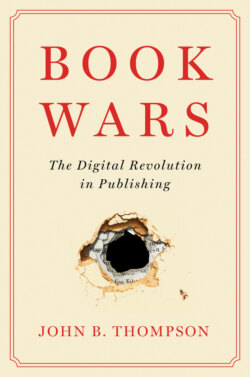Читать книгу Book Wars - John B. Thompson - Страница 12
Chapter 1 THE FALTERING RISE OF THE EBOOK
ОглавлениеAny attempt to recount the history of ebooks presupposes some understanding of what an ebook is. As noted earlier, our understanding of what constitutes a book has been shaped for centuries by the particular form that the book has assumed since Gutenberg – ink printed on sheets of paper that are bound together (glued, sometimes also sewn) along one edge, so that they can be read sequentially and turned over one page at a time, similar to the traditional codex but transformed by the use of paper, ink and the printing press. This form places certain limits on what can and cannot be treated as a book. It would be hard to treat a 20-word text as a book, for instance, as there simply wouldn’t be enough text to fill more than a page (unless this were a very unusual design with 1 or 2 words on a page). Similarly, the text cannot go on indefinitely, or even into millions of words, and still be produced as ‘a book’ in any straightforward sense (though it could be produced as a series of books). In other words, the welding together of content and form in the traditional print-on-paper book places certain contingent limits on what can and cannot be treated as a book. But separate the content from the form and suddenly it is no longer so clear what exactly a book is. Could a 20-word text be a book if there were no pages to turn and the text told a story from beginning to end with splendid conciseness? For the purposes of gathering statistics on book production by country, UNESCO famously defined a book as ‘a non-periodic publication of at least 49 pages exclusive of the cover pages, published in the country and made available to the public’.1 It is understandable that UNESCO wanted to come up with a clear criterion that would enable it to gather cross-national statistics on a comparable basis, but as a way of conceptualizing the book this is clearly an arbitrary number. Why 49 pages? Why not 48, or 45, or 35, or even 10 – why would a text of 45 pages not count as a book if a text of 49 pages would? On the other hand, could a text of several million words be a book if there were no need to print pages, and the form placed no limits on the extent? Once content and form are no longer tied together in the print-on-paper book, it becomes less clear what a book is, and hence what distinguishes, if anything does, a text from a book. Is an ebook simply an electronic text, or is an ebook a species of electronic text that has certain distinguishing properties – and, if so, what are those properties?
These are all perfectly legitimate questions that have exercised commentators, innovators and scholars since the beginnings of the digital revolution, and we will return to them in a later chapter. But for now, I will take a more pragmatic, historical approach: when did the term ‘ebook’ and its cognates enter our vocabulary, who used these terms, and what did they use them to refer to?
